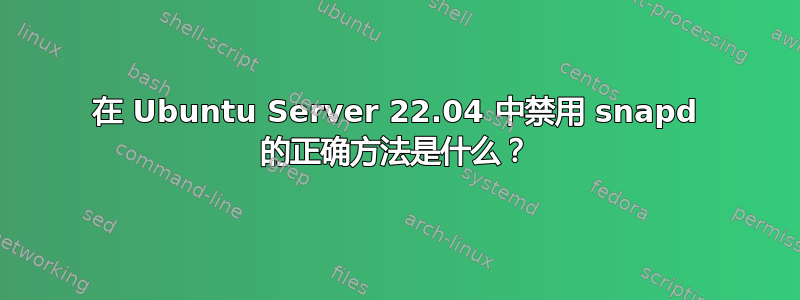
我对 Ubuntu 很陌生。我有几个 Raspberry Pi 用于 Kubernetes 集群,其中装有 Ubuntu Server 22.04 LTS (64-pit),使用其 Imager 工具安装并在 SSD 上运行:
# lsb_release -a
No LSB modules are available.
Distributor ID: Ubuntu
Description: Ubuntu 22.04.3 LTS
Release: 22.04
Codename: jammy
我的目标是优化操作系统的性能并删除 Kubernetes 集群环境中不需要的任何依赖项。
我目前执行的步骤:
- 禁用
atime目录和文件:
# cat /etc/fstab
LABEL=writable / ext4 discard,noatime,errors=remount-ro 0 1
LABEL=system-boot /boot/firmware vfat defaults 0 1
- 禁用
cloud-init(使启动时间从3分钟缩短至20秒):
# touch /etc/cloud/cloud-init.disabled
- 最后,我想禁用
snapd:
# snap list
Name Version Rev Tracking Publisher Notes
core20 20230622 1977 latest/stable canonical✓ base
lxd 5.0.2-838e1b2 24326 5.0/stable/… canonical✓ -
snapd 2.60.4 20298 latest/stable canonical✓ snap
我尝试禁用每个快照并重新启动服务器,但挂载仍然存在:
# for i in core20 lxd snapd; do snap disable $i; done
# for j in snapd.service snapd.seeded.service snapd.socket; do systemctl disable $j; done
# reboot
# df -ah | grep loop
/dev/loop0 60M 60M 0 100% /snap/core20/1977
/dev/loop1 110M 110M 0 100% /snap/lxd/24326
/dev/loop2 47M 47M 0 100% /snap/snapd/19459
/dev/loop3 36M 36M 0 100% /snap/snapd/20298
我临时启动了 snapd 服务来查看 snap 服务是否被正确禁用:
# for i in snapd.socket snapd.service snapd.seeded.service; do systemctl start $i; done
# snap list --all
Name Version Rev Tracking Publisher Notes
core20 20230622 1977 latest/stable canonical✓ base,disabled
lxd 5.0.2-838e1b2 24326 5.0/stable/… canonical✓ disabled
snapd 2.59.5 19459 latest/stable canonical✓ snapd,disabled
snapd 2.60.4 20298 latest/stable canonical✓ snapd,disabled
你能告诉我为什么不拆除支架吗?
我没有看到任何使用这些挂载的进程,删除这些挂载的正确方法是什么?
# lsof | grep loop
就我的情况而言,是否建议从操作系统中完全卸载 snap?
答案1
sudo systemctl stop snapdsudo systemctl mask snapd答案2
经过进一步调查,发现挂载点与已安装的 snap 包相关联,在重启后,删除它们也会删除挂载点。由于我正在使用 Ansible 自动化 Kubernetes 集群部署,因此以下是 OP 中提到的相关任务:
- name: Ubuntu Configuration
notify: Reboot
block:
- name: Disable access time updates
ansible.builtin.replace:
path: /etc/fstab
regexp: 'discard,errors'
replace: 'discard,noatime,errors'
- name: Disable cloud-init service
ansible.builtin.file:
path: /etc/cloud/cloud-init.disabled
access_time: preserve
modification_time: preserve
state: touch
owner: root
group: root
mode: '0644'
- name: Set service facts
ansible.builtin.service_facts:
- name: Remove Snap Packages
when:
- ansible_facts.services['snapd.service'] is defined
- ansible_facts.services['snapd.service'].state == 'running'
block:
- name: Get snap packages
ansible.builtin.command:
cmd: snap list
changed_when: false
register: snap_packages
- name: Remove snap packages
community.general.snap:
name: '{{ item | split | first }}'
state: absent
loop: '{{ snap_packages.stdout_lines[1:] }}'
when: snap_packages.stdout_lines[1:] is iterable
- name: Disable snapd services
ansible.builtin.systemd_service:
name: '{{ item }}'
state: stopped
enabled: false
loop:
- snapd.service
- snapd.seeded.service
- snapd.socket
上面发布的优化使我将启动时间从 3 分钟以上缩短到不到 10 秒:
# systemd-analyze
Startup finished in 6.679s (kernel) + 3.239s (userspace) = 9.918s
graphical.target reached after 3.196s in userspace
是的,我可以继续深入研究,进一步删除 snapd 文件和目录,甚至阻止进一步安装 snap 包。但是,我的目标是只对操作系统设计进行最小程度的更改,以避免升级时可能出现的问题。
值得注意的是,如果卸载,snapd依赖项将会中断apparmor。因此,我选择仅禁用相关服务。
# apt rdepends --installed snapd
snapd
Reverse Depends:
Recommends: ubuntu-server-raspi
Recommends: ubuntu-server
Breaks: apparmor (<< 2.44.3+20.04~)
Recommends: ubuntu-server-raspi
Recommends: ubuntu-server
Breaks: apparmor (<< 2.44.3+20.04~)
Suggests: command-not-found


